Hat Tip to PamsHouseBlend for Youtube video.
for the same non-existent traffic "offense".
Here's traffic case from Dallas, Texas so strange that it makes the front page of the biggest online newspaper in Brazil. A non English-speaking mother was driving her children to school when she made an illegal U-turn. A police officer stopped her and gave her a ticket for not speaking English.
[In Portuguese:] Segundo as normas da cidade de Dallas, os motoristas de táxis e caminhões comerciais devem saber comunicar-se em inglês, mas esta regra não se aplica aos condutores de automóveis de passeio. FolhaOnlineThe question that comes to my mind is, 'Did the police officer fine her only for not speaking English, or did he also fine her for an illegal turn and for driving without a license?' Here's the answer, according to the Dallas Morning News:
[In English:] According to the traffic regulations in the city of Dallas, taxi and commercial truck drivers and must know how to communicate in English, but this rule is not applicable to passenger car drivers. FolhaOnline
Rookie Officer Gary Bromley cited Mondragon for three violations: disregarding a traffic control device, failure to present a driver's license and "non-English speaking driver. DallasNews.ComThis case was not an isolated incident but occured at least 39 other times. The Dallas Morning News says:
Now, how can this be understood as anything but an anti-immigrant, anti-brown people application of police color and linguistically-aroused discrimination. The police were effectively telling these Latinos, we don't want you here and we have the law on our side. Only the law the were enforcing didn't exist.Dallas police wrongly ticketed at least 39 drivers for not speaking English over the last three years, Police Chief David Kunkle announced Friday while promising to investigate all officers involved in the cases for dereliction of duty.
Pending cases will be dismissed, and those who paid the $204 fine for the charge, which does not exist in the city, will be reimbursed, Kunkle said. DallasNews.Com
The citations were issued in several different patrol divisions by at least six different officers. One of those officers was responsible for five of the citations, Kunkle said. DallasNews.ComThese, in my opinion, were acts of anti-Latino antagonism unsupported by de jure law, but nonetheless under color of law.
The statute in question encourages police officers to stop people skin color, hair and facial characteristics indicate that they may not speak English. It's a pro-profiling statute, although news reports aren't clear whether the offense is based in state or federal law.According to department policy, a sergeant must also sign off on all citations. The supervisor who signed off on the Mondragon ticket was Sgt. David Burroughs, 50.
Also Online"In this case, the field training officer was aware of ultimately what the recruit officer had done," Kunkle said. "The field training officer is going to bear more responsibility than the recruit officer."
Mondragon, a native Spanish speaker, challenged the charge in court and it was dropped, her daughter said. Dallas police said they will drop all charges against Mondragon, who speaks limited English and does have a Texas driver's license.
A reader of this blog recently pointed out that we focus on police abuses where Black people are the victims. That's true. But Black people's skin is normally not really "black." It's brown, just like the skin of many of the Latino people who were pulled over in Dallas, Texas and issued citations under a law that did not apply to them. All profiling based on skin color is a concern for this blog.
One way of understanding profiling is to say that people are targetted because they are Black. Another way of understanding profiling is that people are targetted because their skin is not white. It's really the latter understanding that explains why Latinos and Blacks are pulled over at rates two and three times that of whites; if we had white skin we would be pulled over less often. And that's part of why Black women straighten their hair: to look more white and take advantage of the privileges that accrue to whiteness in the USA. But, obviously straightening their hair doesn't change the color of their skin, which is the basis of most profiling.






No comments:
Post a Comment